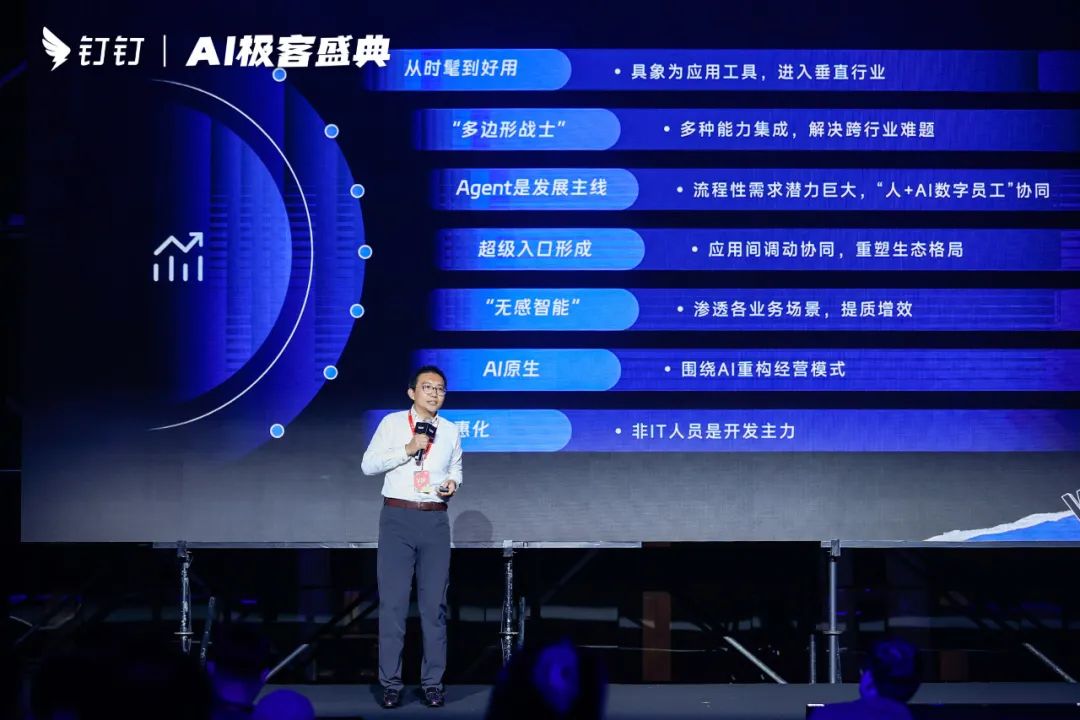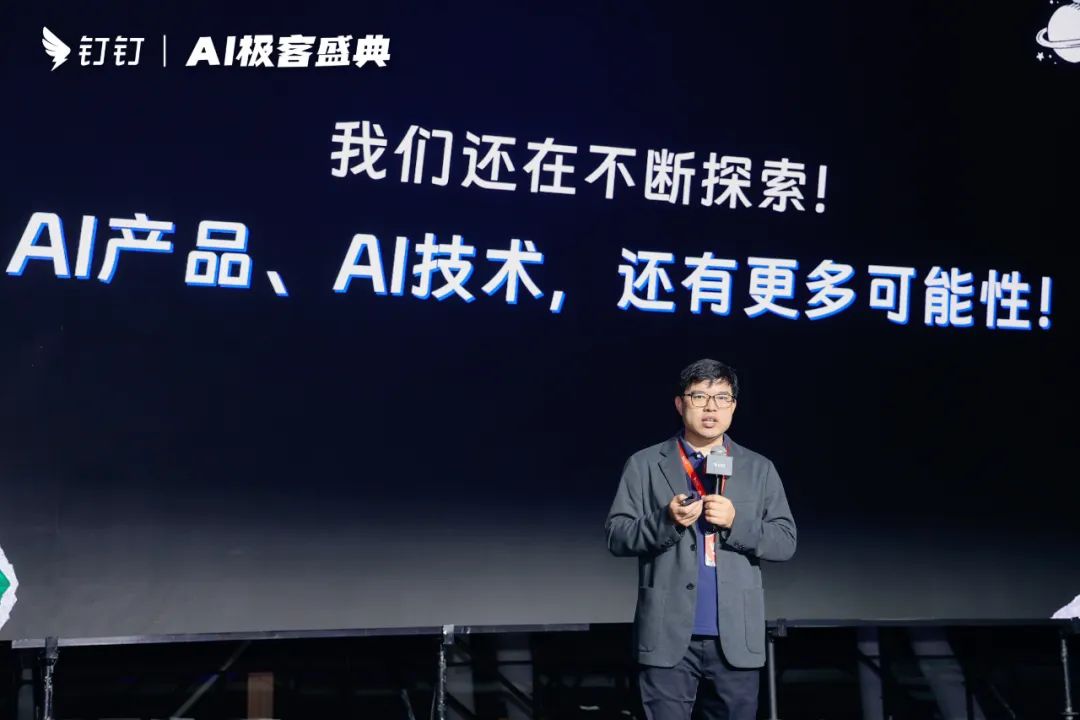
Thank you for following us!

Introduction

As one of the important development trends in AI, AI Agents represented by digital employees have garnered widespread attention in the industry. Especially in the enterprise service sector, an increasingly vibrant ecosystem is forming a new force that drives AI into real scenarios.
We believe that whoever captures the scenarios will capture AI. So among the numerous ecosystem participants, who will be the first to seize this wave of benefits?
The AI Agent Ecosystem May Rise

Last year, the continuous popularity of AGI has led to a wave of AI Agents. According to research institutions, the global AI Agent market is expected to reach billions of dollars by 2024, and the intensity of its fervor is unimaginable.
However, amidst the expanding demand and application trends, another phenomenon is even more noteworthy.
Unlike previous technological revolutions, this time the application of technology has quickly been locked in on the enterprise service track, leading to unprecedented consensus among large companies, startups, and large model vendors in choosing scenarios. For instance, primary AI Agents represented by virtual office assistants and intelligent customer service have already been widely applied in specific business scenarios.
As Huang Lei, the dean of the Financial Academy, mentioned at the AI Geek Festival hosted by DingTalk, the enterprise track has become one of the three major application tracks for AI. He emphasized that the rise of AI Agents will drive the intelligentization of enterprises and continuously enhance core business value, thus achieving a comprehensive transformation of operating and production models.

In fact, just as AI Agents have become the mainstream trend in the enterprise service track, the related industrial chain and ecosystem have also entered the integration stage. Currently, the entire AI Agent ecosystem has taken shape. It is expected that in the next ten years, we will witness its rise.
From last April to now, DingTalk’s intelligent development has just reached its first anniversary, yet it has brought about tremendous changes.
In terms of products, they have created over 20 intelligent product lines, involving at least 80 scenarios of AI application; on the platform side, DingTalk has completed the model training and data management behind AI Agents using the large model training platform “Alchemy Furnace” and the AI assistant creation platform. Particularly, the latter can help developers, enterprises, and ISVs quickly generate AI assistant applications using natural language.
More importantly, in terms of ecosystem, the DingTalk platform has incubated hundreds of thousands of AI assistants and, in response to strong market demand, has created the country’s first AI Agent store. Currently, the DingTalk AI assistant market has officially launched. According to official disclosures, the first batch has listed over 200 AI assistants, covering various scenarios such as enterprise services, industry applications, education, and entertainment, and they are ready to use.
However, whether this business model can work in the domestic market, whether DingTalk can find a differentiated path to realization, is still uncertain. But we are extremely confident that with technological advancements and the continuous release of market demand, the application of large AI models and ecosystem construction will achieve tremendous development. The AI Agent ecosystem, as a branch of the entire AI ecosystem, will also play an increasingly important role.
As DingTalk CTO Cheng Caohong said at the AI Geek Festival, they are still exploring, and there are more possibilities for AI products and technologies. How will DingTalk further enrich the ecosystem and collaborate with ISVs and enterprise owners to build AI assistants?

Let’s see what they have done!
In AI, DingTalk is Still Playing the Ecosystem Card

Currently, several domestic companies and institutions have achieved significant results in the field of AI Agents, and various types of intelligent agents have been launched, such as practical AI agents used in office automation and Lanma Technology’s Ask XBot, which focuses on expert empowerment and employee use.
In contrast to these scattered innovations, DingTalk’s approach is different. They initiated a systematic innovation activity in this field with the theme “Imagination is Productivity” through an AI assistant creation competition. This competition not only stimulates participants’ innovative vitality and promotes the application of large models but also allows for the immediate discovery of outstanding works and creators, encouraging them to attempt commercialization.

It is reported that the competition has set three tracks: enterprise, office, and higher education/lifestyle, collecting over 700 entries. Particularly in the first two tracks, which are more focused on ToB scenarios, applications such as public security administrative assistants, intelligent breeding experts, and aircraft maintenance assistants have stood out and achieved excellent results in the top ten of the tracks.
According to DingTalk’s observations, many of these outstanding works were submitted by enterprise clients and SaaS vendors. These works focus on actual application scenarios in enterprises and aim to solve the pain points and difficulties in the process of digital transformation. I found that in improving work efficiency and optimizing business processes, many works can create greater value in specific scenarios, while also having clear market demand and growth potential.
Take the award-winning work in the enterprise track—Shenzhen Airlines Sales Helper as an example, let’s see how these applications generate and deliver value.
Previously, Shenzhen Airlines’ ticket distribution system “Shenzhen Airlines Sales Platform” provided training during user use and used traditional manuals and knowledge bases, but due to frequent functional iterations and adjustments in the sales department and seat personnel, a large amount of manual Q&A was still required daily to obtain information, resulting in low efficiency and huge communication costs. At the same time, frontline sales personnel needed to log into the Shenzhen Airlines Sales Platform system to query order ticket information, which was not timely and convenient enough, and a large amount of data accumulated in the system was not fully utilized.
To solve these problems, Shenzhen Airlines built the Shenzhen Airlines AI Sales Assistant—”Shenzhen Airlines Sales Helper” based on DingTalk’s Yida platform, integrating the sales management system “Cloud Sales Platform” built by Yida, connecting multiple internal sales-related systems, and providing employees with a very user-friendly entry to access and use this data.

Employees can inquire using natural language, “What is the most recent ticket issuance time?” “How has the ticket issuance situation been in the last 12 hours?” and this agent will call the interface, query in real time, and display the relevant data in chart form. This agent can also answer users’ common questions by connecting to the knowledge base. This agent can also provide order ticket inquiries for non-system users. Sales personnel can directly ask the AI assistant, “Who is the ticket agent for XXX ticket/order? What are the specific details?” without going through system users; the AI assistant will directly query the B2B system’s ticket issuance data and return the required ticket information.
More importantly, this AI assistant is not only used internally but can also be applied by external partners, thereby improving communication efficiency both internally and externally.
Regarding value, through the deep integration of AI Agents, Shenzhen Airlines has not only achieved cost reduction and efficiency improvement in marketing operations but also enhanced customer service experience, strengthened information security, and promoted data fusion among various systems, thereby effectively utilizing enterprise data assets.
In fact, within DingTalk’s AI Agent ecosystem, there are many such products. The emergence of AI Agents allows enterprise daily management and operational tools to no longer be confined to traditional software forms but to act more like “employees” within the organization, collaborating together. DingTalk’s powerful AI product and ecosystem capabilities enable new technologies to quickly land in enterprise scenarios, helping enterprises integrate AI more rapidly.
Cheng Caohong once described that with DingTalk’s AI Agent ecosystem, not only can you create products more conveniently, but you can also achieve “package allocation”. This unique capability, which distinguishes it from other ecosystems, allows product value to be realized quickly.
Real Scenarios Are What Make AI Agents “Come Alive”

Currently, many SaaS vendors are dedicated to the development and application of AI Agents, but very few are involved in ecosystem construction. Abroad, companies like Microsoft Copilot and Salesforce have already completed relevant business layouts, while in the domestic market, aside from DingTalk, no other major enterprise service companies have made significant follow-up actions.
As a comprehensive enterprise service platform vendor, DingTalk’s advantage in leading AI Agent ecosystem construction is extremely obvious. As a subsystem of the entire ecosystem construction, the AI Agent ecosystem can completely carry all the capabilities and resources of the original ecosystem, including technical support, open platforms, partner networks, etc., thus laying a good foundation for forming a prosperous AI Agent ecosystem.
At the same time, to better apply large models to enterprise scenarios, DingTalk launched the AI PaaS platform last year. It connects large models with the real needs of users across various industries, allowing the capabilities of large models to naturally enter real scenarios and demands.
Such an important product, how could DingTalk not open it to partners? Now, ecosystem partners can also leverage the capabilities of AI PaaS to achieve intelligent application development and deployment. With its support, partner development will become more direct and simple.
In addition, we cannot overlook that DingTalk’s strategic layout in the enterprise service market has a strong foresight. By continuously launching new features and services, it not only leads the trend of enterprise digital transformation but also provides more innovative motivation and growth points for its partners within the ecosystem.
As DingTalk advocates, the future has arrived, please embrace AI wholeheartedly. In this process, DingTalk will leverage AI-native thinking and concepts, create synergistic effects, activate data consumption, and explore high-value landing scenarios with ecosystem partners.
Conclusion: The Era of AI Agent Prosperity Has Begun
This year, the AI Agent ecosystem will exhibit unprecedented vitality and vigor.
From the supply side, as major companies launch AI Agent platforms, numerous startups and developers actively respond, utilizing these platforms to develop innovative applications, which drives the richness and innovation of the entire ecosystem content.
From the demand side, the continuous increase in enterprise users’ acceptance of AI Agents further stimulates market demand growth, providing strong momentum for the prosperity of the AI Agent ecosystem.
From the capital market perspective, their attention and investment enthusiasm for the AI Agent ecosystem are continuously high, also promoting the integration and collaboration of the industrial chain, and continuously impacting the construction of the AI Agent ecosystem.
Regardless, this indicates that an era full of innovation and opportunities for AI Agent prosperity has begun. Next, can DingTalk avoid the situation where OpenAI’s Agent Store has cooled down in the U.S., can it successfully run the Chinese-style Agent Store business model? Can it truly enable AI Agents to land in various industries?
Let us believe that after showcasing the ecosystem card, DingTalk will make everything a reality.
About the Chief Information Officer
/ Click the image to learn more
The public account “Chief Information Officer” was founded by a senior media person, dedicated to using professional writing, precise insights, unique services, and in-depth practice to serve enterprises in the digital intelligence field, igniting “micro-light” for the development of the industry!
